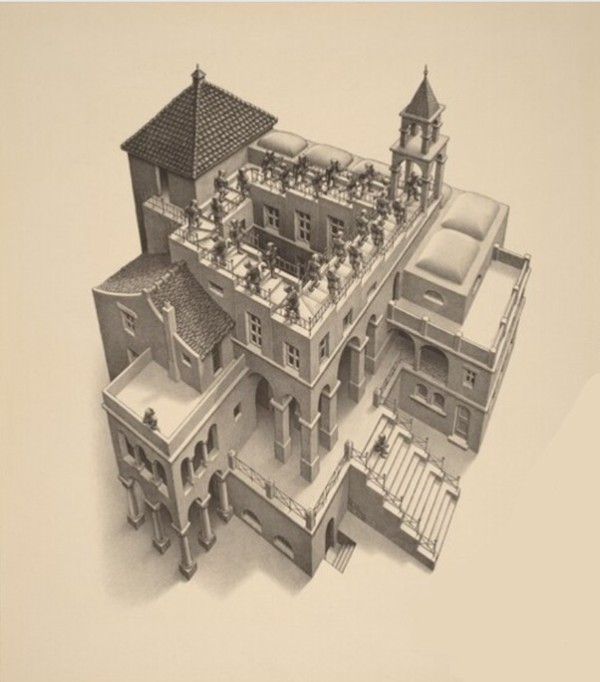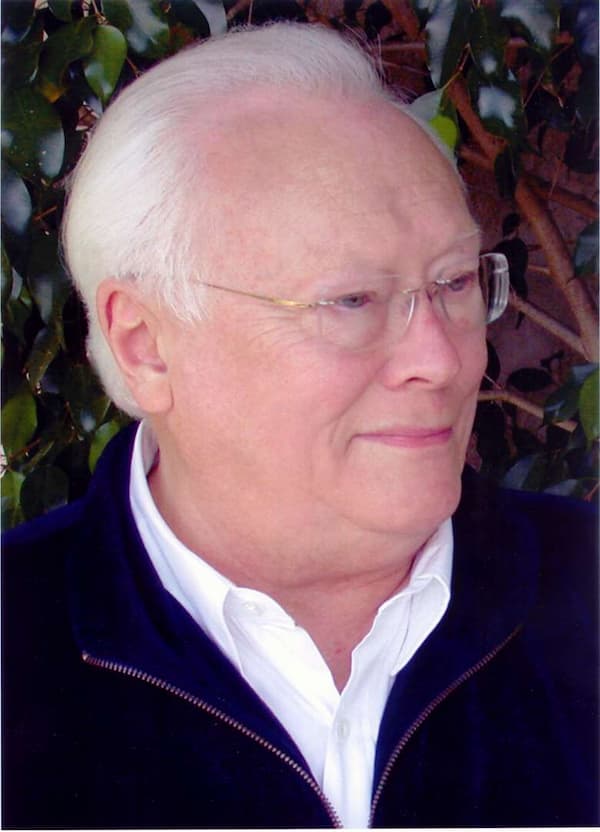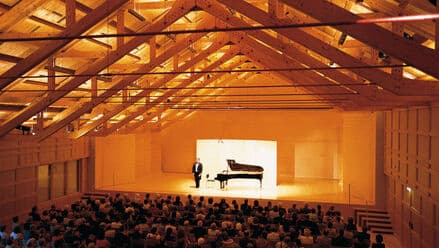Published in 1982, Revolting Rhymes by Roald Dahl re-interpreted six well-known fairy tales, deliciously deviating from traditional versions. Just one year later, Dahl married Felicity d’Abreu Crosland, who was instrumental in setting up “The Roald Dahl Foundation” shortly after his death in 1990.
The Roald Dahl Foundation
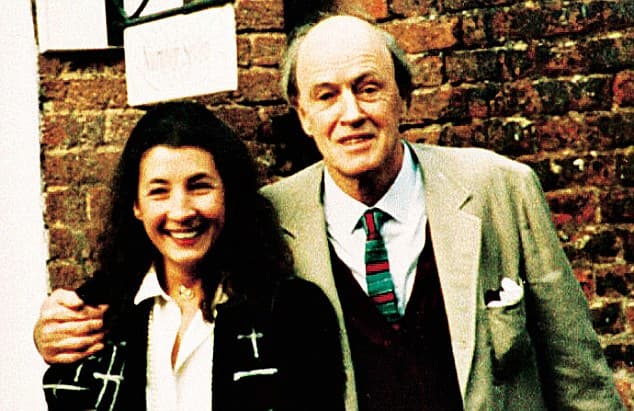
Felicity and Roald Dahl
Felicity Dahl established the foundation to support young people suffering from literacy or health issues. It has since grown exponentially and was renamed the “Roald Dahl’s Marvellous Children’s Charity” in 2010. The Foundation supports a number of projects, but its main mission is to provide specialist nurses and support for seriously ill children living with complex, lifelong conditions.
Since 1992, the award-winning TV film producer and librettist Donald Sturrock, who grew up in England and South America, has been the artistic director of the Roald Dahl Foundation. Sturrock had made a documentary film about Dahl in 1985 and, in due course, became a friend of the family.
The Revolting Rhymes Project
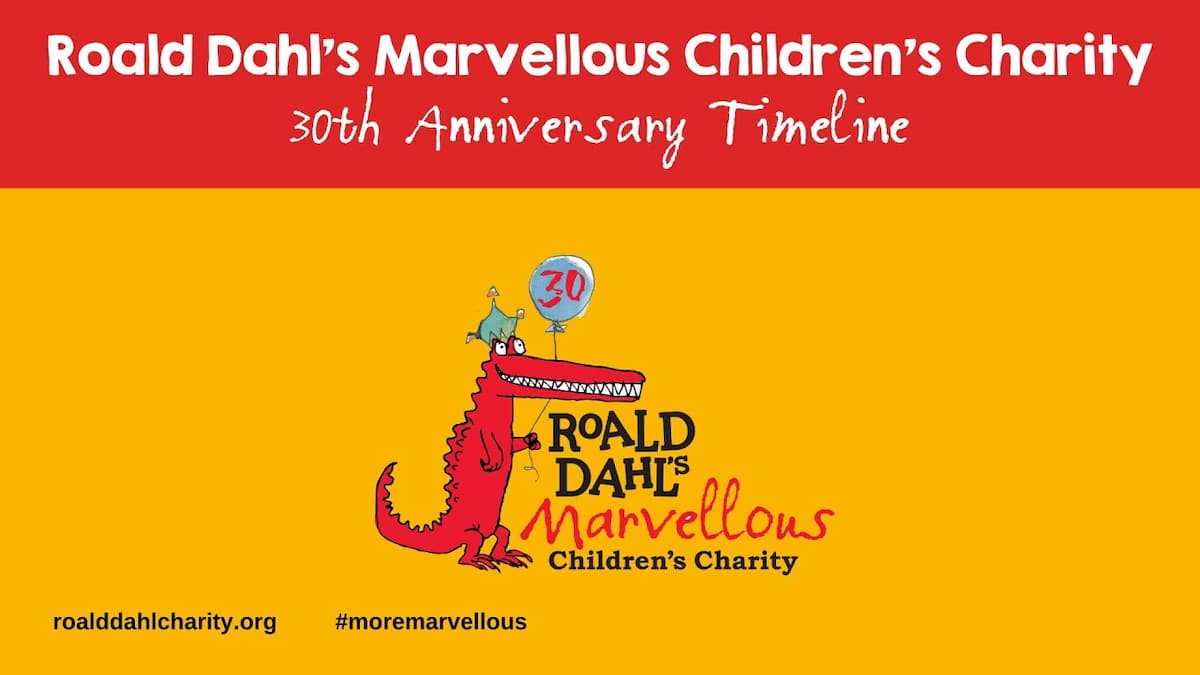
Roald Dahl Marvellous Children’s Charity
The author’s widow was looking for musical settings of poems from Revolting Rhymes, and Sturrock began to adapt the words. By great fortune, Dahl had written a script for a possible television adaptation, using puppets and the re-telling of “Little Red Riding Hood.” Sturrock realised that this could form the basis of a single longer work and devised a text in which Dahl’s original verses were augmented by prose dialogue and narration.
All profits from performances and recordings would go in support of the “Roald Dahl Marvellous Children’s Charity,” and Sturrock started his search for suitable composers. Dahl had previously disliked all musical attempts that sought to notate exact rhythms for his verses. As such, it was decided that the words were to be spoken freely against an orchestral background, much like in the tradition of Prokofiev’s Peter and the Wolf and Poulenc’s Barbar the Elephant. As we have heard in our previous episode, Paul Patterson crafted his witty musical setting for “Little Red Riding Hood,” and Eleanor Alberga was tasked to take on “Snow White and the Seven Dwarfs.”
Eleanor Alberga
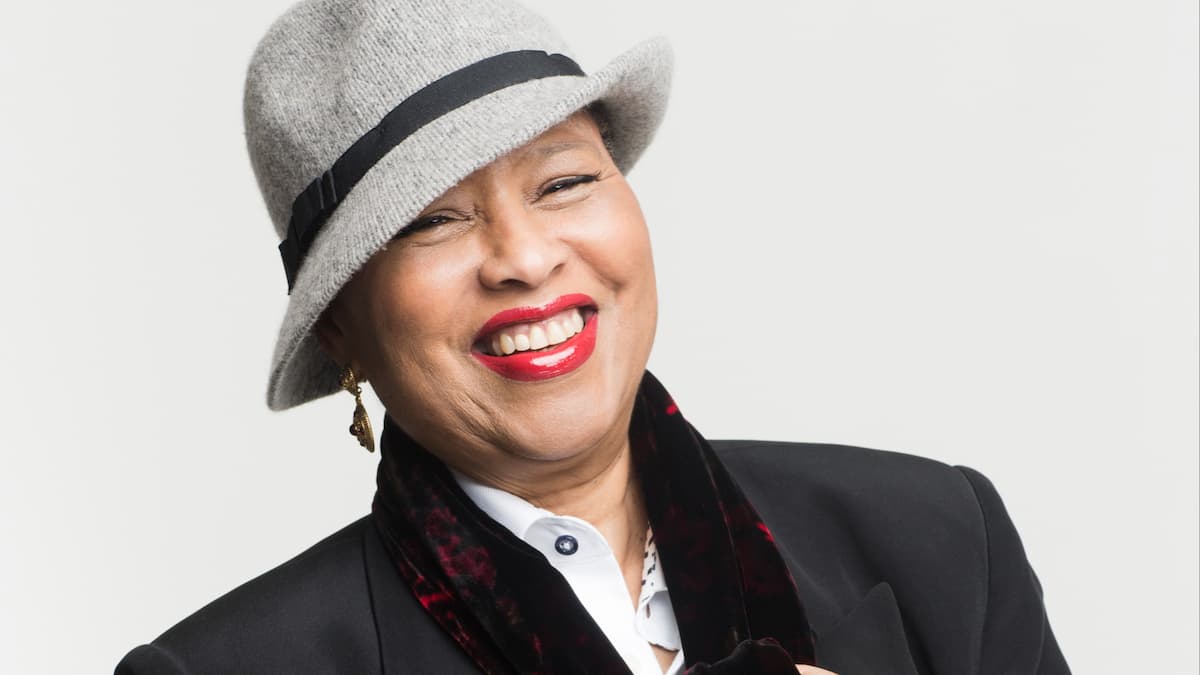
Eleanor Alberga
Eleanor Alberga is a highly-regarded mainstream British composer with commissions from the BBC Proms and The Royal Opera, and Covent Garden. Her substantial output ranges from works for solo instruments to full-scale symphonic compositions, and opera. Much of her music is based on tonal harmony with a decided emphasis on repeated rhythmic patterns. Born in Kingston, Jamaica, Alberga decided at the age of five to become a concert pianist, and her first compositions were penned at the age of 10.
Alberga won the biennial Royal Schools of Music Scholarship for the West Indies in 1968, and transferred to the Royal Academy of Music in London to study piano and singing. In short time, she was one of 3 finalists in the International Piano Concerto Competition in Dudley, UK in 1974, and her compositions were taken up by The London Contemporary Dance Theatre in 1978. She would subsequently become the company’s Musical Director, but decided to leave the company to fully embark on her calling as a composer.
Snow White and the Seven Dwarfs
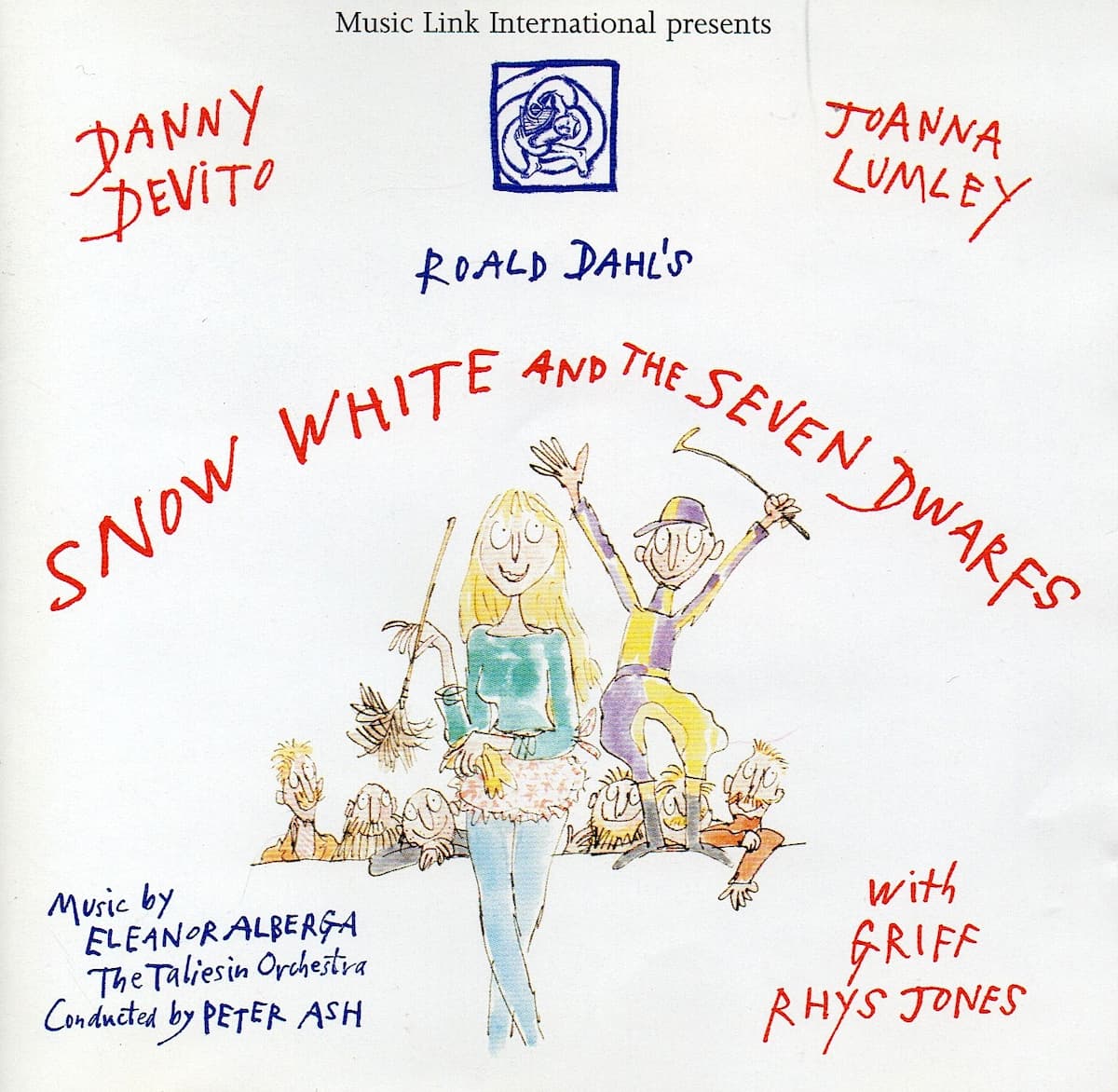
Roald Dahl’s Snow-White and the Seven Dwarfs
Alberga was commissioned by the Roald Dahl Foundation in 1994 to musically encode Dahl’s subversive comic eye, which deliciously turns favourite fairy tales completely on their heads. And predictably, it all started with Dahl’s Revolting Rhyme.
When little Snow-White’s mother died
The King, her father, up and cried
“Oh, what a nuisance! What a life!
Now I must find another wife.”
(It’s never easy for a King
To find himself that sort of thing.)
He wrote to every magazine
And said, “I’m looking for a Queen.”
At least ten thousand girls replied
And begged to be the royal bride
The king said with a shifty smile
“I’d like to give each one a trial.”
However, in the end he chose
A lady called Miss Maclahose
Who brought along a curious toy
That seemed to give her endless joy.
This was a mirror framed in brass
A MAGIC TALKING LOOKING GLASS
Ask it something day or night
It always got the answer right
For instance, if you were to say
“Oh Mirror, what’s for lunch today?”
The thing would answer in a trice
“Today it’s scrambled eggs and rice.”
Now every day, week in week out
The spoiled and stupid Queen would shout
“Oh Mirror Mirror on the wall
Who is the fairest of them all?”
The Mirror answered every time
“Oh Madam, you’re the Queen sublime
are the only one to charm us
Queen, you are the cat’s pyjamas.”
For ten whole years the silly Queen
Repeated this absurd routine
Then suddenly, one awful day
She heard the Magic Mirror say
“From now on Queen, you’re number two
Snow-White is prettier than you.”
The Queen went absolutely wild
She yelled, “I’m going to scrag that child.”
“I’ll cook her flaming goose, I’ll skin her
I’ll have her rotten guts for dinner.”
She called the Huntsman to her study
She shouted at him, “Listen, buddy,
You drag that filthy girl outside
And see you take her for a ride
Thereafter slit her ribs apart
And bring me back her bleeding heart.”
The Huntsman dragged the lovely child
Deep deep into the forest wild
Fearing the worst, poor Snow-White spake
She cried, “Oh please give me a break.”
The knife was poised, the arm was strong
She cried again, “I’ve done no wrong.”
The Huntsman’s heart began to flutter
It melted like a pound of butter.
He murmured, “Okay, beat it, kid.”
And you can bet your life she did
Later, the Huntsman made a stop
Within the local butcher’s shop
And there he bought, for safety’s sake
A bullocks heart and one nice steak
“Oh Majesty! Oh Queen,” he cried
“That rotten little girl has died.
And just to prove I didn’t cheat
I’ve brought along these bits of meat.”
The Queen cried out, “Bravissimo
I trust you killed her nice and slow.”
Then (this is the disgusting part)
The Queen sat down and ate the heart
(I only hope she cooked it well
Boiled heart can be as tough as hell)
While all this was going on
Oh where, oh where had Snow-White gone?
She’d found it easy, being pretty
To hitch a ride into the city
And there she’d got a job, unpaid
As general cook and parlour-maid
With seven funny little men
Each one not more than three foot ten
Ex horse-race jockeys, all of them
These seven dwarfs, though awfully nice
Were guilty of one shocking vice
They squandered all of their resources
At the race-track backing horses
(When they hadn’t backed a winner
None of them got any dinner)
One evening, Snow-White said, “Look here,
I think I’ve got a great idea
Just leave it all to me, okay,
And no more gambling till I say.”
That very night, at eventide
Young Snow-White hitched another ride
And then, when it was very late
She slipped in through the Palace gate
The King was in his counting house
Counting out his money
The Queen was in the parlour
Eating bread and honey
The footmen and the servants slept
So no one saw her as she crept
On tip-toe through the mighty hall
And grabbed THE MIRROR off the wall
As soon as she had got it home
She told the Senior Dwarf (or Gnome)
To ask it what he wished to know
“Go on,” she shouted, “Have a go.”
He said, “Oh Mirror, please don’t joke
Each of us is stony broke
Which horse will win tomorrow’s race,
The Ascot Gold Cup Steeple-chase?”
The Mirror whispered sweet and low
“The horse’s name is Mistletoe.”
The Dwarfs went absolutely daft
They kissed young Snow-White fore and aft
Then rushed away to raise some dough
With which to back old Mistletoe
They pawned their watches, sold the car
They borrowed money near and far
(For much of it they had to thank
The Manager of Barclays Bank)
They went to Ascot and of course
For once they backed the winning horse
Thereafter, every single day
The Mirror made the bookies pay
Each Dwarf and Snow-White got a share
And each was soon a millionaire
Which shows that gambling’s not a sin
Provided that you always win.
Musical Setting
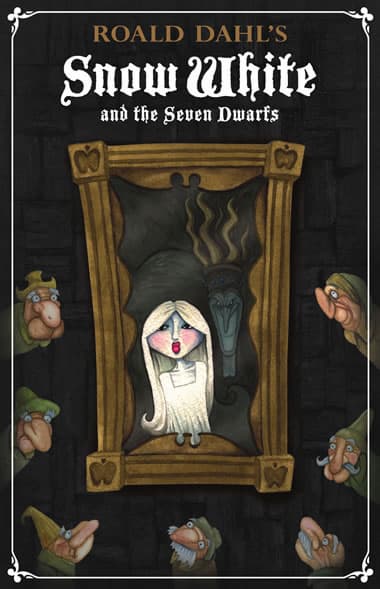
Roald Dahl’s Snow-White and the Seven Dwarfs
Donald Sturrock, who adapted the text, explains that Alberga’s musical treatment of “Snow White and the Seven Dwarfs” is “a jewel of story-telling in sound, revelling in the thrills, wit and madcap humour of Dahl’s dark literary frolic, albeit in a grander, more extravagant sonic landscape.” As listeners, we are immediately drawn into a magical atmosphere that is simultaneously charming, funny, disturbing, terrifying, exciting and joyous.
The text provides an entertaining narrative which keeps the story moving forward, but much of the emotional impact of the piece is presented in the eight dances, which form the dramatic spine of the work. Each of the characters has an assigned theme that changes as the story unfolds. Snow-White’s music is innocent and youthful, even naively fanciful, while the stepmother is easily identified by music that reflects her fickle and wicked ego.
Special Effects
You will easily hear that the Forest occasionally comes alive, and it is clothed in a gleamingly magnificent musical fabric. The Mirror is “grand, moody, and magical, while the Jockeys are endlessly, foolishly, optimistic, gambling their money away at the race-course.” Special musical effects are also used for the chewing of the heart, a snake, the horses’ hooves, the King counting his money, and the terrifying call of the Huntsman.
Alberga’s setting has been called “a work of compelling beauty and atmospheric intensity that can be enjoyed by anyone with a sense of fantasy and imagination.” And while the music is sometimes complex, it is always connected to the story. Bold and colourful, a spirit of joy permeates the entire piece. It is a “bewitching, intoxicating, breathless journey through a world of intense emotional energy and exotic excitement to a conclusion that is utterly life-affirming. Indeed, by the time the Caribbean rhythms and carnival mood of the whirling Celebration Dance take hold of you, it is hard to stop yourself leaping out of your seat.”
For more of the best in classical music, sign up for our E-Newsletter


